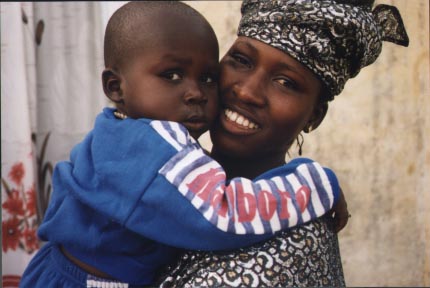Nigeria Strikes Back at British American Tobacco
 Tobacco companies target Nigerian youth (Photo by Essential Action)If you think the U.S. tobacco industry is bad, you'll find the behavior of many of the same companies overseas to be truly shocking.
Tobacco companies target Nigerian youth (Photo by Essential Action)If you think the U.S. tobacco industry is bad, you'll find the behavior of many of the same companies overseas to be truly shocking.
Happily, the industry is beginning to be held accountable for its operations in the Global South. Nigeria's two largest states are following the lead of U.S. states, in suing British American Tobacco (BAT) of Nigeria, its U.K. parent company and Philip Morris International for the health care costs of treating sick smokers, The Times of London reported this week.
The new lawsuits demonstrate the importance of the online public databases of previously secret tobacco industry documents. The 1998 U.S. Master Settlement Agreement required major tobacco companies to reveal millions of pages documenting unethical -- and even illegal -- marketing, public relations and lobbying campaigns. A lesser-known treasure trove is the British American Tobacco Documents Archive, which has made some seven million pages of BAT documents freely available. These documents are of particular importance to countries like Nigeria.
 Tobacco companies target Nigerian youth (Photo by Essential Action)The two new lawsuits cite internal BAT documents that reveal the details of . Many describe behavior that these same companies would not dare engage in, in the U.S. or other Western countries.
Tobacco companies target Nigerian youth (Photo by Essential Action)The two new lawsuits cite internal BAT documents that reveal the details of . Many describe behavior that these same companies would not dare engage in, in the U.S. or other Western countries.
In just one example, a 1991 marketing report prepared for BAT in the United Kingdom shows the company's awareness that people in Nigeria tend to start smoking as young children:
New smokers enter the market at a very early age in many cases, as young as 8 or 9 years seems to be quite common. Most of our respondents had started smoking before they left junior school. ... Initially, smoking is motivated by curiosity and a desire to 'look big', but it rapidly becomes a habit and a necessity.
BAT also knew how underage youth in Nigeria usually obtain cigarettes, according to the marketing report:
Young illicit smokers prefer to buy sticks [single cigarettes] (except when they are going out for the evening), as they can smoke them straight away in the street and avoid the problem of detection.
The document reveals that BAT knew many Nigerians believe that cigarettes actually offer physical and health benefits:
Smoking is widely seen to offer a number of benefits:
- as in other African markets, it is believed to aid/speed digestion and to prevent vomiting after eating
- smoking is said to aid/speed excretion - it is apparently common practice for smokers to have a cigarette when they go to the toilet
- smoking is believed to stimulate you when you are depressed (nicotine content relevant here)
And a relationship between cigarettes and alcohol use is highlighted:
Smoking is widely believed and used to heighten the effect of alcohol (the stronger the cigarette, the greater the effect). ... Cigarettes provide an alternative to alcohol for non-drinkers.
Lastly, the BAT document acknowledges that "few, if any, [Nigerian] smokers have really taken the dangers of smoking on board." In other words, Nigeria is a particularly fertile market for marketing cigarettes because of widespread ignorance about the health hazards of smoking.
Documents like the one cited above can be easily found at the BAT Documents Archive by searching for "Nigeria," "youth" and "marketing." Hopefully this readily accessible evidence, along with legal efforts like the Nigerian lawsuits, will finally convince tobacco companies that true corporate social responsibility is important even when marketing to poor people in the Global South.
It's fitting that news of Nigeria's lawsuits came just before World No Tobacco Day, May 31. The observance was created to focus attention on public health efforts around the world to decrease the human toll of tobacco companies.




